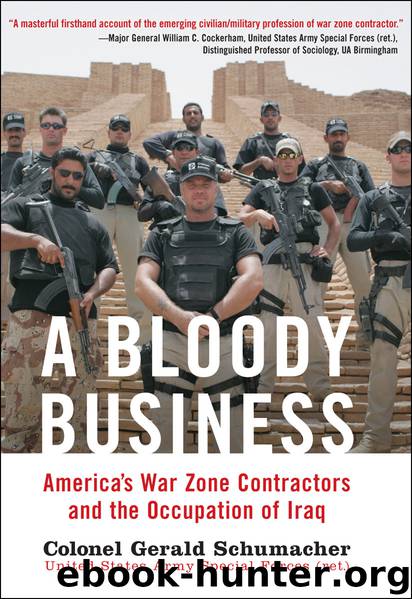A Bloody Business by Gerry Schumacher

Author:Gerry Schumacher
Language: eng
Format: epub
Publisher: MBI
Published: 2010-08-19T04:00:00+00:00
Chapter 7
Security Contractors
I. An Overview
During an attack on a headquarters in Najaf, Iraq, eight Blackwater security contractors found themselves facing hundreds of Iraqi militia fighters. While urgently calling for U.S. military reinforcements, in the middle of the firefight, Blackwater’s own helicopters brought in ammunition and supplies to the besieged contractors. They also coordinated an aerial medical evacuation of a wounded marine. At the same time, near the city of Kut, UN forces assigned to protect coalition administrators abandoned them, leaving their fate to the enemy. While the UN forces continued their retreat, a group of security contractors fought for three days in a heroic attempt to save the administrators.
Hart Security, a British firm, was on contract to protect a local construction project. A UN military unit was responsible for securing the area. The UN unit abandoned them, and the contractors found themselves alone and in an intense firefight with the enemy. Under intense enemy fire, they were eventually evacuated and forced to leave one of their own dead behind. It’s no small wonder that security contractors are demanding more and more sophisticated weapons and greater flexibility in their response.
Civilian security personnel are not contracted to attack people while in Iraq. They are not directed to conduct operations against insurgent forces. Contrary to the movie stereotypes, they are not hired to conduct covert assassinations. They are contracted by private companies and coalition governments to provide security for people, vehicles, buildings, construction sites, energy facilities, and water-treatment plants. Enemy tactics targeting these people and the facilities they guard have created circumstances beyond the contractors’ control.
The complexity of this new kind of war has rendered international law obsolete in many ways. Attempts to enforce definitions of combatants and noncombatants are muddled. Private military contractors are caught in the catch-22 situation of trying to conform to laws and regulations regarding civilian conduct in a war zone and dealing with the realities of the jobs they are asked to perform. In at least one instance where the military disarmed four private contractors, a few hours later the contractors were captured by insurgents, tortured, and killed. On whose hands is their blood?
In broad terms, there are two types of security contractors operating in Iraq: those contracted by the U.S. State Department, and those providing security for dozens of other coalition operations. Some contracting firms, like Blackwater, execute both types of contracts with different teams. The composition, personnel, equipment, and operating policies for State Department contracts are very specific and highly regulated. Ostensibly, all firms are under the control of the Coalition Provisional Authority—in other words, the U.S. military. State Department contracts are awarded to U.S. firms and require that all personnel be U.S. citizens. The teams are equipped with U.S. weapons, protective gear, and vehicles.
In contrast, contracts to private security companies by independent businesses or contracts awarded by government agencies other than the State Department such as the Army Corps of Engineers contract with Erinys Security and allow for any composition of personnel from most any country.
Download
This site does not store any files on its server. We only index and link to content provided by other sites. Please contact the content providers to delete copyright contents if any and email us, we'll remove relevant links or contents immediately.
| Africa | Americas |
| Arctic & Antarctica | Asia |
| Australia & Oceania | Europe |
| Middle East | Russia |
| United States | World |
| Ancient Civilizations | Military |
| Historical Study & Educational Resources |
The Radium Girls by Kate Moore(11081)
The Templars by Dan Jones(4293)
100 Deadly Skills by Clint Emerson(4248)
Rise and Kill First by Ronen Bergman(4173)
The Doomsday Machine by Daniel Ellsberg(3884)
The Rape of Nanking by Iris Chang(3663)
Killing England by Bill O'Reilly(3559)
Hitler in Los Angeles by Steven J. Ross(3540)
Stalin by Stephen Kotkin(3204)
12 Strong by Doug Stanton(3142)
Hitler's Monsters by Eric Kurlander(2831)
Darkest Hour by Anthony McCarten(2734)
Blood and Sand by Alex Von Tunzelmann(2726)
The Art of War Visualized by Jessica Hagy(2508)
Hitler's Flying Saucers: A Guide to German Flying Discs of the Second World War by Stevens Henry(2401)
The Code Book by Simon Singh(2365)
The Second World Wars by Victor Davis Hanson(2197)
Babylon's Ark by Lawrence Anthony(2146)
Tobruk by Peter Fitzsimons(2134)
